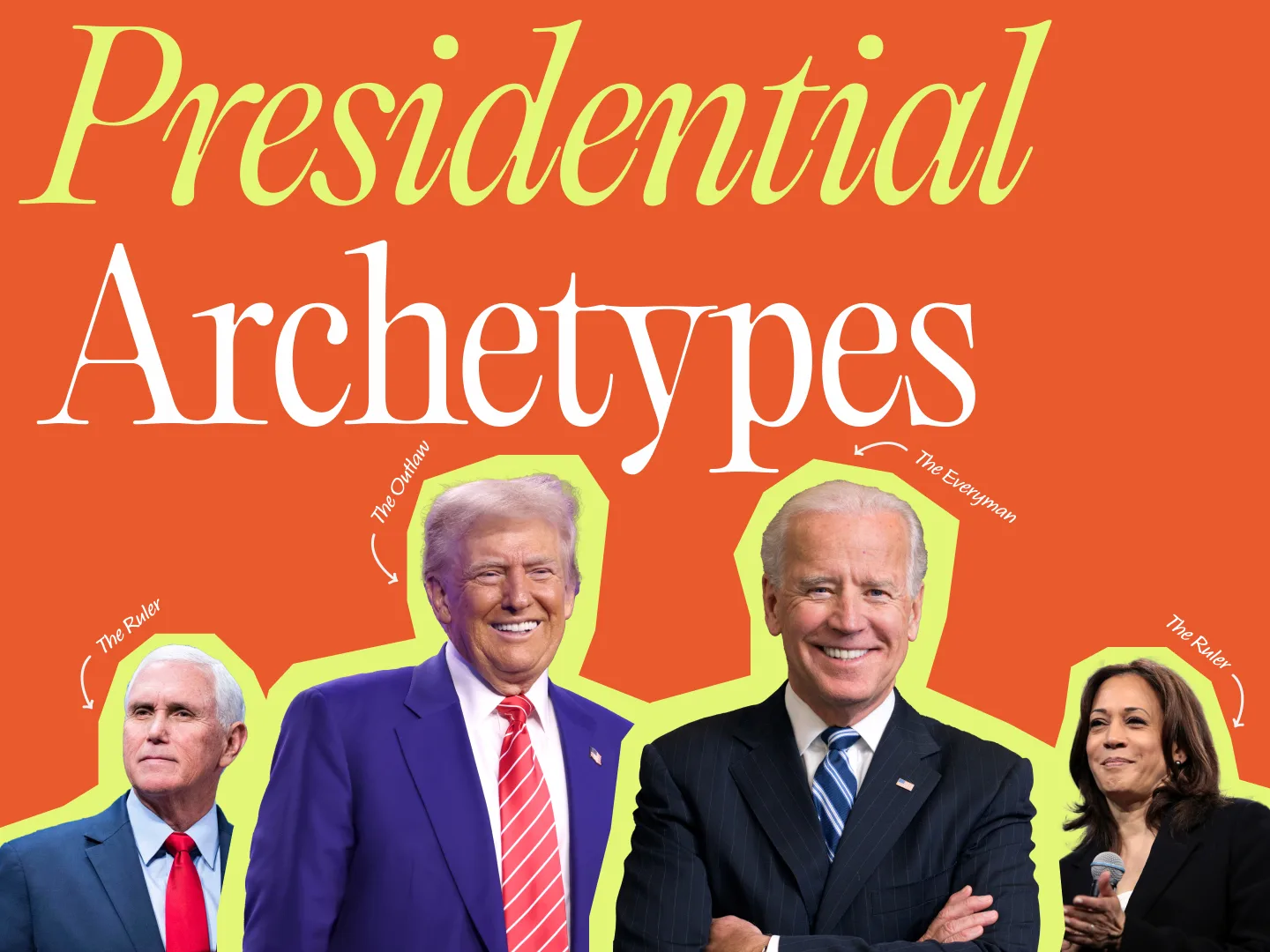
KEY TAKEAWAYS
- The 2020 election pits polar-opposite headlining archetypes against one another.
- Party affiliation influences how deeply a candidate can entrench themselves in an archetypal position.
- Position strength could have an impact on the election outcome.
Election Day 2020 is right around the corner.
And perhaps unsurprisingly, politics is occupying a great deal of time on the airwaves and space in people’s minds—maybe even too much so. We learned first-hand just how much passion the political process in the United States inspires while working on Pete Buttigieg’s campaign for the Democratic presidential nomination, one ultimately won by Joe Biden.
That our society dedicates so much time, energy, and money to politics serves as a reminder that it’s the ultimate forum for branding and the purveyors of it. Every four years, millions—and lately, closer to billions—of dollars are poured into political campaigns, blanketing our media with communications aimed at positioning candidates in the voters’ minds, and ultimately, persuading their constituents to vote for them.
So, in the hope that this experiment we call America is destined to continue beyond November 3rd, and to demonstrate the power of our methodology, we’re taking a look at the presidential ticket nominees through our very own archetyping lens. As Americans race to the polls to decide on a president for the 59th time in our nation’s history, we’re exploring the major players in this year’s election in an effort to better understand who they are, what makes them tick, and how they can inspire such fervent enthusiasm among their supporters.
Disclaimer: this evaluation is approximate. Without access to the candidates themselves, we have nothing but public content and statements by which to track them around our archetype wheel. Furthermore, our judgment of each candidate’s strength of position does not indicate an endorsement for that candidate.

Donald Trump
Archetype: Outlaw
Position Strength: 9/10
Let’s start with the most obvious player: Donald Trump.
Trump’s anti-establishment tenor has defined his candidacy and presidency. An exhaustive list of outrageous Trumpisms could literally fill a decent-sized book, so we’ll focus instead on his most recent and inflammatory statements and actions:
- He refuses to call the coronavirus by its name, opting instead to refer to it as the “China Virus”
- He wouldn’t commit to a peaceful transition of power were he to lose the election
- He routinely riles up crowds at rallies by encouraging chants of “12 more years!”
- In this year’s first presidential debate, he interrupted Joe Biden an astounding 71 times
The list goes on. This type of behavior is atypical of even the most rough-edged career politician and very clearly positions Donald Trump as an outsider, a rebel who’s arrived to burn the system down. Trump’s outlaw positioning has represented the picture of consistency since before he launched his first presidential campaign.
The genius of this type of strategy is two-fold. First, there are no other outlaws in the field, leaving a vast “blue ocean” in this part of the archetype wheel relative to his competition.
Additionally, being the outlaw grants Trump license to say and do whatever he wants, a freedom other politicians don’t enjoy. He’s literally playing by a different set of rules, because, after all, he’s the outlaw, so he’s expected to say and do outrageous things. The more crazy things he says and does, the stronger his position as the outlaw becomes, and the more his supporters love him. Brilliant.

Joe Biden
Archetype: Everyman
Position Strength: 8/10
Though less clearly defined than Donald Trump, Joe Biden has worked hard to establish his own—more conventional—positioning, that of the everyman. Frequently reminding voters that he’s “…just a kid from Scranton, Pennsylvania,” Joe Biden’s words and policies reinforce such a position. From his habit of looking into the camera and speaking directly to the American people during presidential debates to his support for tax reform aimed at raising taxes only on those Americans making more than $400,000, everything Biden does and says is intended to leave us with one impression: I get you because I am you.
A quick survey of Biden’s website reinforces this idea: his “Meet Joe” page begins his life timeline with the heading, “Humble Beginnings.” The rest of the timeline reads like a blue-collar biography.
This type of positioning occurs frequently among politicians. Other famous everyman presidents include George W. Bush, Jimmy Carter, and Abraham Lincoln. And more recently, as the Democratic party has at least attempted to position itself as the party of the people—“Building a Stronger, Fairer Economy,” “Achieving Universal, Affordable, Quality, Health Care” are prominent section titles included in this year’s official party platform—an everyman presidential candidate is a natural fit. Even Joe’s academic credentials lack the typical Ivy League prestige that’s become so common among high-profile politicians.
While the everyman political strategy is far more common, it’s also much more delicate. Trump’s positioning is unaffected by allegations of sexual misconduct, whereas Biden’s is threatened. Trump can withstand accusations of nepotism, whereas Biden cannot. The everyman’s line guiding personal conduct is far finer than that of the outlaw.

Kamala Harris
Archetype: Ruler
Position Strength: 5/10
Kamala Harris, undistracted with grand, ambitious visions of a wholly revised society—and in stark contrast to other headlining politicians like Bernie Sanders—sees the world through rules and their enforcement. As the New York Times noted, “She sees [governing] as an enterprise of writing careful rules and enforcing them with determination, more than engineering transformational social change.”
This, of course, is consistent with her path to high-profile politics which weaved its way through criminal justice in California before ultimately landing her on the democratic ticket next to Joe Biden. Strategically, the selection of a ruler-type running mate alongside an everyman like Joe Biden is a shrewd move. After all, lest the everyman’s communal approach to governing be viewed as too soft by America’s more law-and-order constituents, well, there’s a ruler sidekick prepared to bring a little—compassionate, progressive—stability to the platform. A great one-two punch.
The problem with Harris’ position is that the modern iteration of the Democratic platform wasn’t built to accommodate a ruler approach to governing. Taking hard-line stances on immigration or criminal justice doesn’t fit as neatly into the party platform as it might—and as we’ll soon explore—on the more conservative side of things. So, Harris has spent some time and energy softening her ruler track record, which makes for a more broadly appealing persona, even if it is a little watered-down.

Mike Pence
Archetype: Ruler
Position Strength: 9/10
Easily the most religious character on either ticket, Mike Pence’s policy stances and personal behavior are closely guided by his devout Christian fundamentalism. This makes for an easy archetype assignment. Where does he stand on abortion? Look to the bible. Gay marriage? Look to the bible. Women in the military? Look to the bible. Even when the bible dictates conflicting prescriptions, one can bet the bank on Mike Pence siding with the more conservative, draconian biblical instruction nearly every time. In Pence’s worldview, a stable and sustainable societal order is contingent upon strict adherence to a fundamental interpretation of the good book.
And just as Harris’ ruler tendencies balance out Biden’s egalitarian approach, Pence’s ruler influence brings some much-needed structure to Trump’s wrecking ball nature.
The pitfall of Pence’s particular flavor of ruling, however, is just how conservative it is. Voters with even moderately progressive ideas about how to govern a nation of 335 million people will almost certainly be turned off by Pence’s dogmatism. There’s just not much room for alternative perspectives in such a rigid worldview, making his policy stances very narrow in their appeal.
Conclusion
It should be noted that our conclusions on the relative strength of each of these archetypal positions don’t constitute a prediction about the outcome of the race—there are simply too many other variables at play. But at the very least, this exercise demonstrates the branding power of archetypes, not just to sell products, but to shape politics—and the courses of nations.
